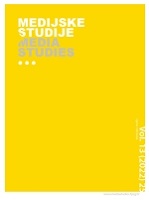Models of TV newsroom organization and news routines in Croatia: Case studies of HRT, Nova TV & N1
Models of TV newsroom organization and news routines in Croatia: Case studies of HRT, Nova TV & N1
Author(s): Petra Kovačević, Tena PerišinSubject(s): Media studies, Theory of Communication, Management and complex organizations
Published by: Fakultet političkih znanosti u Zagrebu
Keywords: newsroom; organization; newsroom routines; journalism; integrated newsroom; TV news;
Summary/Abstract: The efforts of today’s journalism to win back the audiences’ trust and meet the expectations of audiences, while remaining committed to high-quality journalism, has been reflected in organizational and cultural changes in newsrooms. The digitalization of news production processes meant developing new newsroom organization models and news routines. As television is still the most trusted media in Croatia, this study focuses on three Croatian television newsrooms – the public broadcaster HRT, the commercial broadcaster Nova TV, and the most-watched non-terrestrial news channel N1 – and explores their different models of organization and how they have adapted to a transformed media environment and audience expectations. For this, a series of exploratory semi-structured interviews are conducted with a total of 28 journalists and editors. This study examines newsroom practices, the efficiency of newsroom integration or convergence implementation (if any), and the attempts to produce and distribute original innovative content across platforms. The study also tackles the main opportunities and obstacles that discourage or encourage them to produce what they perceive as quality stories and build engagement and trust in journalism. Findings point to three distinct newsroom integration and organization formats shaped by several important factors – past newsroom traditions, technology, ownership (Nova TV), foreign investors, international consultants, politics (HRT) and ultimately the format of the channel (N1). This is predominantly reflected in the news production process, or more precisely, in the ways editors and journalists create and shape the daily news program. Differences are identified in workflow between journalists employed by the public service broadcaster and its counterparts.
Journal: Medijske studije
- Issue Year: 13/2022
- Issue No: 25
- Page Range: 66-89
- Page Count: 24
- Language: English

